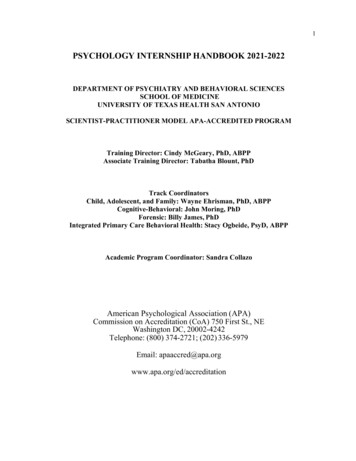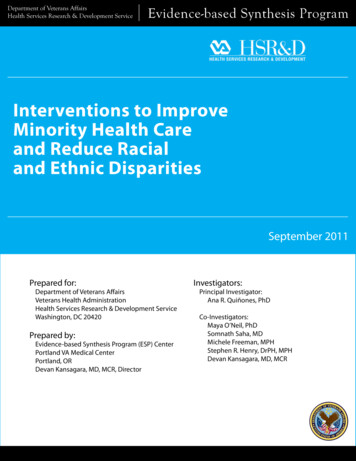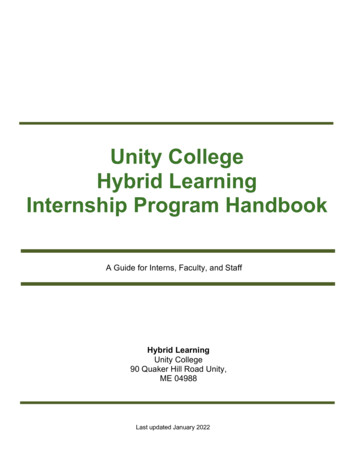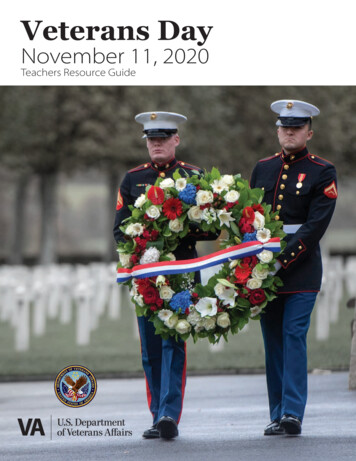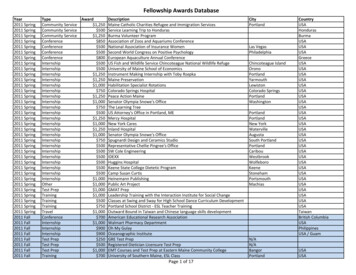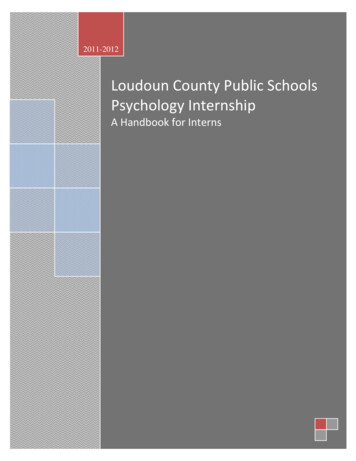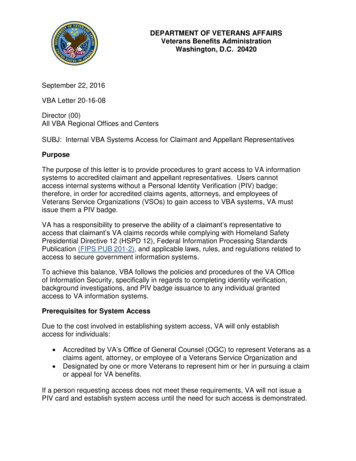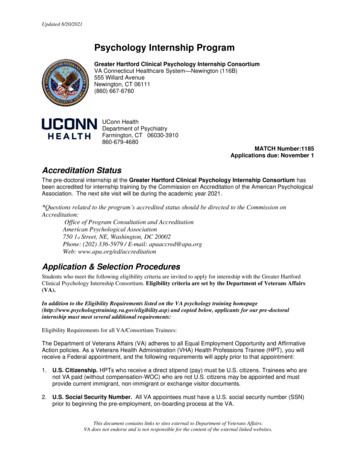
Transcription
Updated 8/20/2021Psychology Internship ProgramGreater Hartford Clinical Psychology Internship ConsortiumVA Connecticut Healthcare System—Newington (116B)555 Willard AvenueNewington, CT 06111(860) 667-6760UConn HealthDepartment of PsychiatryFarmington, CT 06030-3910860-679-4680MATCH Number:1185Applications due: November 1Accreditation StatusThe pre-doctoral internship at the Greater Hartford Clinical Psychology Internship Consortium hasbeen accredited for internship training by the Commission on Accreditation of the American PsychologicalAssociation. The next site visit will be during the academic year 2021.*Questions related to the program’s accredited status should be directed to the Commission onAccreditation:Office of Program Consultation and AccreditationAmerican Psychological Association750 1st Street, NE, Washington, DC 20002Phone: (202) 336-5979 / E-mail: apaaccred@apa.orgWeb: www.apa.org/ed/accreditationApplication & Selection ProceduresStudents who meet the following eligibility criteria are invited to apply for internship with the Greater HartfordClinical Psychology Internship Consortium. Eligibility criteria are set by the Department of Veterans Affairs(VA).In addition to the Eligibility Requirements listed on the VA psychology training ibility.asp) and copied below, applicants for our pre-doctoralinternship must meet several additional requirements:Eligibility Requirements for all VA/Consortium Trainees:The Department of Veterans Affairs (VA) adheres to all Equal Employment Opportunity and AffirmativeAction policies. As a Veterans Health Administration (VHA) Health Professions Trainee (HPT), you willreceive a Federal appointment, and the following requirements will apply prior to that appointment:1. U.S. Citizenship. HPTs who receive a direct stipend (pay) must be U.S. citizens. Trainees who arenot VA paid (without compensation-WOC) who are not U.S. citizens may be appointed and mustprovide current immigrant, non-immigrant or exchange visitor documents.2. U.S. Social Security Number. All VA appointees must have a U.S. social security number (SSN)prior to beginning the pre-employment, on-boarding process at the VA.This document contains links to sites external to Department of Veterans Affairs.VA does not endorse and is not responsible for the content of the external linked websites.
August 20, 20213. Selective Service Registration. Male applicants born after 12/31/1959 must have registered for theSelective Service by age 26 to be eligible for U.S. government employment, including selection as apaid or WOC VA trainee. For additional information about the Selective Service System, and toregister or to check your registration status visit https://www.sss.gov/. Anyone who was required toregister but did not register before the age of 26 will need to apply for a Status Information Letter(SIL) and request a waiver. Waivers are rare and requests will be reviewed on a case by case basisby the VA Office of Human Resources Management. This process can take up to six months for averdict.4. Fingerprint Screening and Background Investigation. All HPTs will be fingerprinted and undergoscreenings and background investigations. Additional details about the required background checkscan be found at the following website: ion/executiveorder/10450.html.5. Drug Testing. Per Executive Order 12564, the VA strives to be a Drug-Free Workplace. HPTs arenot drug-tested prior to appointment, however are subject to random drug testing throughout theentire VA appointment period. You will be asked to sign an acknowledgement form stating you areaware of this practice. See item 8 below.6. Affiliation Agreement. To ensure shared responsibility between an academic program and the VAthere must be a current and fully executed Academic Affiliation Agreement on file with the VHA Officeof Academic Affiliations (OAA). The affiliation agreement delineates the duties of VA and the affiliatedinstitution. Most APA-accredited doctoral programs have an agreement on file. More informationabout this document can be found at https://www.va.gov/oaa/agreements.asp (see section onpsychology internships). Post-degree programs typically will not have an affiliation agreement, as theHPT is no longer enrolled in an academic program and the program is VA sponsored.7. TQCVL. To streamline on-boarding of HPTs, VHA Office of Academic Affiliations requires completionof a Trainee Qualifications and Credentials Verification Letter (TQCVL). An Educational Official at theAffiliate must complete and sign this letter. For post-graduate programs where an affiliate is not theprogram sponsor, this process must be completed by the VA Training Director. Your VA appointmentcannot happen until the TQCVL is submitted and signed by senior leadership from the VA facility. Formore information about this document, please visit https://www.va.gov/OAA/TQCVL.aspa. Health Requirements. Among other things, the TQCVL confirms that you, the trainee,are fit to perform the essential functions (physical and mental) of the training program andimmunized following current Center for Disease Control (CDC) guidelines and VHApolicy. This protects you, other employees and patients while working in a healthcarefacility. Required are annual tuberculosis screening, Hepatitis B vaccine as well asannual influenza vaccine. Declinations are EXTREMELY rare. If you decline the fluvaccine you will be required to wear a mask while in patient care areas of the VA.b. Primary source verification of all prior education and training is certified via theTQCVL. Training and Program Directors will be contacting the appropriate institutions toensure you have the appropriate qualifications and credentials as required by theadmission criteria of the training program in which you are enrolled.8. Additional On-boarding Forms. Additional pre-employment forms include the Application forHealth Professions Trainees (VA 10-2850D) and the Declaration for Federal Employment (OF306). These documents and others are available online for review at https://www.va.gov/oaa/appforms.asp. Falsifying any answer on these required Federal documents will result in the inability toappoint or immediate dismissal from the training program.9. Proof of Identity per VA. VA on-boarding requires presentation of two source documents (IDs).Documents must be unexpired and names on both documents must match. For more informationvisit: https://www.oit.va.gov/programs/piv/ media/docs/IDMatrix.pdf2
August 20, 2021Additional information regarding eligibility requirements for appointment as a psychology HPT can befound at the end of this brochure.Additional information regarding eligibility requirements (with hyperlinks) Trainees receive term employee appointments and must meet eligibility requirements for appointmentas outlined in VA Handbook 5005 Staffing, Part II, Section B. Appointment Requirements andDeterminations. https://www.va.gov/vapubs/viewPublication.asp?Pub ID 646&FType 2Selective Service website where the requirements, benefits and penalties of registering vs. notregistering are outlined: fits-and-PenaltiesAdditional information specific suitability information from Title 5 (referenced in VHA Handbook5005 – hyperlinks included):(b)Specific factors. In determining whether a person is suitable for Federal employment, only the followingfactors will be considered a basis for finding a person unsuitable and taking a suitability action:(1) Misconduct or negligence in employment;(2) Criminal or dishonest conduct;(3) Material, intentional false statement, or deception or fraud in examination or appointment;(4) Refusal to furnish testimony as required by § 5.4 of this chapter;(5) Alcohol abuse, without evidence of substantial rehabilitation, of a nature and duration that suggeststhat the applicant or appointee would be prevented from performing the duties of the position inquestion, or would constitute a direct threat to the property or safety of the applicant or appointee orothers;(6) Illegal use of narcotics, drugs, or other controlled substances without evidence of substantialrehabilitation;(7) Knowing and willful engagement in acts or activities designed to overthrow the U.S. Government byforce; and(8) Any statutory or regulatory bar which prevents the lawful employment of the person involved in theposition in question.(c)Additional considerations. OPM and agencies must consider any of the following additionalconsiderations to the extent OPM or the relevant agency, in its sole discretion, deems any of thempertinent to the individual case:(1) The nature of the position for which the person is applying or in which the person is employed;(2) The nature and seriousness of the conduct;(3) The circumstances surrounding the conduct;(4) The recency of the conduct;(5) The age of the person involved at the time of the conduct;(6) Contributing societal conditions; and(7) The absence or presence of rehabilitation or efforts toward rehabilitation.Students interested in applying for the internship program are directed to www.appic.org tocomplete and submit the AAPIAll required application materials must be submitted by November 1, 2020 to the attention of:Greater Hartford Clinical Psychology Internship Consortiumc/o Gary Bryson, PsyD (116B)VA Connecticut Healthcare System--Newington555 Willard AvenueNewington, CT 06111(860) 594-6348 or e-mail: gary.bryson@va.gov3
August 20, 2021Internship Program Tables Updated August 20, 2021Internship Program AdmissionsBriefly describe in narrative form important information to assist potential applicants in assessing their likelyfit with your program. This description must be consistent with the program’s policies on intern selectionand practicum and academic preparation requirements:Applicants must come from APA approved clinical or counselling psychology programs. The average number ofintervention hours for recent classes has been substantially higher than our minimums. The Consortium offersan intensive, generalist, clinical internship designed to provide a flexible, varied, and balanced educationalexperience within the context of a scientist-practitioner model of training. Its objectives include providing acomprehensive set of learning experiences in all major areas of clinical functioning arranged around three, fourmonth major rotations. Clinical skills and professional growth develop through substantial contact with a diversesupervisory faculty, varied clinical experiences and collegial stimulation via the development of a cohesive andactive peer group of interns who have regular and meaningful interaction. The hallmark of the program is varietyand flexibility, so as to meet the individual needs and interests of each intern.Does the program require that applicants have received a minimum number of hours of the following attime of application? If Yes, indicate how many:Total Direct Contact Intervention HoursNY X Amount: 600 hoursTotal Direct Contact Assessment HoursNY X Amount: 50 hoursDescribe any other required minimum criteria used to screen applicants:Comprehensive Exams passed by the application deadlineDissertation Proposal Approved by the start of internshipThe Consortium is truly a national training program. In the last decade interns have come from: Universityof Albany, Binghamton University, Boston University, University of California-San Diego, University ofCentral Florida, University of Cincinnati, University of Connecticut, University of Denver, FordhamUniversity, University of Hartford, University of Hawaii, Hofstra University, University of Houston, LongIsland University-C.W. Post, Long Island University-Brooklyn, LaSalle University, University of Maine,Univerity of Massachusetts, Massachusettes School of Professional Psycholgy, New York University,Nova Southeastern University, University of Rhode Island, Rutgers University, University of South Florida,University of Southern California, Seton Hall University, Stony Brook University, Virginia Tech, Universityof Washington, University of West Virginia, University of Vermont, Wheaton College, and Yale University.4
August 20, 2021Financial and other support for upcoming trainingyear (2021-22)Benefits table for the 4 interns paid through VA CTAnnual Stipend/Salary for Full-time InternsAnnual Stipend/Salary for Half-time InternsProgram provides access to medical insurance for intern?If access to medical insurance is provided:Trainee contribution to cost required?Coverage of family member(s) available?Coverage of legally married partner available?Coverage of domestic partner available?Hours of Annual Paid Personal Time Off (Vacation)Hours of Annual Paid Sick LeaveIn the event of medical conditions and/or family needs that requireextended leave, does the program allow reasonable unpaid leaveto interns/residents in excess of personal time off and sick leave?Other Benefits (please describe): 29, 228N/AYes XNoYes XNoYes XNoYes XNoYes XNoApproximately 100Approximately 100Yes XNoBenefits table for the 1 intern paid through UConn HealthAnnual Stipend/Salary for Full-time Interns* 33,274.95Annual Stipend/Salary for Half-time Internsn/aProgram provides access to medical insurance for intern?If access to medical insurance is provided:Trainee contribution to cost required?Coverage of family member(s) available?Coverage of legally married partner available?Coverage of domestic partner available?Hours of Annual Leave Paid Personal Time OffHours of Annual Paid Sick LeaveYes XNoYes XYes XYes XYes XNoNoNoNo00In the event of medical conditions and/or family needs that requireextended leave, does the program allow reasonable unpaid leaveto interns/residents in excess of personal time off and sick leave?Yes XNo*The salary mechanism for the UCH intern does not allow for paid time off or paid sickdays. For that reason the UCH salary includes pay for 13 days of vacation, 13 days of sicktime and 10 Federal Holidays, as received by VA-paid interns.5
August 20, 2021Initial Post-Internship PositionsTotal # of interns who were in the last 3 cohorts2019-202114Total # of interns who did not seek employment because theyreturned to their doctoral program/are completing doctoral degreeCommunity mental health centerFederally qualified health centerIndependent primary care facility/clinicUniversity counseling centerVeterans Affairs medical centerMilitary health centerAcademic health centerOther medical center or hospitalPsychiatric hospitalAcademic university/departmentCommunity college or other teaching settingIndependent research institutionCorrectional facilitySchool district/systemIndependent practice settingNot currently employedChanged to another 0000021000Note: “PD” Post-doctoral residency position; “EP” Employed Position. Each individualrepresented in this table should be counted only one time. For former trainees working inmore than one setting, select the setting that represents their primary position.Interns graduating from the Consortium typically have had excellent success at attaining post-doctoraltraining opportunities in their chosen areas. Past interns have gone on to Post-Internship experiences inthis and other VA Hospitals, university medical centers, private practice, community mental health centersand industry. Recent graduates have gone on to do their postdoctoral fellowships in such institutions as:Hartford Hospital/ Institute of Living, Harvard/Deaconess Consortium, Columbia University CounselingCenter, VA Providence, VA Connecticut, Yale, Hillside Hospital University and Northwell Health System,as well as a host of private practice post doc and employment experiences.6
August 20, 2021Internship SettingThe Greater Hartford Clinical Psychology Internship Consortium (Consortium) represents the collaborativeeffort of the VA Connecticut Healthcare System-Newington Campus (VA) and UConn Health (UCH) to shareresources and faculty for the purpose of providing a diversified educational program.The Consortium faculty is large and diverse, representing a variety of doctoral programs and encompassing abreadth of clinical, research, professional, and programmatic interests. All share a commitment to qualitypatient care, to learning and research, and to excellence in teaching.Responsibility for the internship program resides in the Consortium Training Committee, composed of theConsortium Director, a Director of Training from UCH, and an intern representative. The Committee ischarged with overall administration of the program, including formulation of training and policy objectives, andmonitoring ongoing programs and activities.The Consortium offers one-year, full-time internships in clinical psychology beginning July 1, and ending June30 of the following year. The Consortium currently offers five full--time stipends. The base stipend (set by theVA) is 29,228 annually and the stipend for the UCONN intern is slightly higher ( 33,274) as they do notreceive paid time off. . Health and life insurance benefits are available for all interns. Depending on the exactday that the internship starts, VA interns may have to wait a maximum of 3 weeks to get their first stipendpayment and the UCONN intern may have to wait 4 weeks. The two institutions have different pay cyclesand the time to enter a given cycle may vary depending on where in the cycle the first day of work fall.The internship is designed to meet the Standards of Accreditation (SOA-2017) promulgated by theAmerican Psychological Association for Health Service Psychology, as well as specific needs of theindividual interns. All interns have access to all training sites within the Consortium in a variety of ways: Through rotationsThrough supervisionThrough a year-long series of formal weekly seminars.Training Model and Program PhilosophyThe Consortium offers a general clinical internship designed to provide a flexible, varied, and balancededucational experience within the context of a scientist-practitioner model of training. Its objectivesinclude: An intensive set of learning experiences in all major areas of clinical functioningProfessional growth through contact with a diverse supervisory faculty, andCollegial stimulation via the development of a cohesive and active peer group of interns whohave regular and meaningful interaction.The program is flexible so as to meet the individual needs and interests of each intern. This flexibility ismade possible by: The diversity of available supervisionThe diversity of available rotation settingsA rich program of shared clinical and seminar experiences, andThe fact that the stipends are not dependent upon the amount or nature of clinical workload.The Consortium holds that the role of the psychology intern is that of an emerging professional. Internsare expected to gradually assume and develop unique roles as independent professionals as theybecome proficient in the clinical skills common to all doctoral-level professional psychologists. As atraining program, we highly value the role of the supervisory relationship in facilitating intern growth and7
August 20, 2021development across clinical, academic, and professional domains. We work to create a positive culture inwhich interns feel supported and valued, while also challenged to grow professionally. Interns areultimately expected to exhibit satisfactory levels of competency within the broad areas outlined in theAPA’s Standards of Accreditation (SOA) 2017. These include developing competencies in: ethics,individual and cultural diversity, psychological evaluation and treatment planning, effective use ofresearch, psychotherapy, consultation, developing a professional identity, developing professionalcommunication skills, documenting clinical notes, and developing an understanding of supervision andconsultation. Allocation of time in these areas may vary with skills and interests, but all interns should beable to perform the following functions satisfactorily by the end of the internship:Psychological evaluation, diagnosis and conceptualization -- Interns will be able to: Effectively utilize interview findings, clinical observations and clinical judgment in identifying oneor more diagnoses and in developing treatment plansAppropriately support the above with symptom- or diagnostic-specific test instrumentsCorrectly interpret evaluation data and render accurate inferencesEffectively communicate evaluation findings via written reports and progress notesBrief and long-term individual and group treatment -- Interns will be able to: Conceptualize presenting problems and set appropriate treatment goalsEstablish effective therapeutic alliancesSelect, justify, and apply different treatment interventions in the individual and/or group contextArticulate an understanding of the overall therapy processArticulate an understanding of the interactive nature of the therapeutic relationshipProfessional development -- Interns will be able: To be accountable, dependable, responsible, and shows initiativeTo appropriately manage boundaries in all professional contextsTo be concerned for the welfare of others and their general well-beingTo conduct oneself and dress in a professional mannerConsultation to other disciplines regarding psychological issues -- Interns will be able to: Develop and maintain effective professional relationships with a variety of other professional andallied health disciplinesWork with individuals of other professions to maintain a climate of mutual respect and sharedvalues in regards to inter-professional practice. This includes appreciation and integration ofcontributions and perspectives of other professions.Diversity and cultural competency — interns will be able to: Understand how their own personal/cultural history, attitudes and biases interact with people whoare different from themselvesDemonstrate sensitivity and be responsive to issues of individual and cultural diversityIntegrate awareness and knowledge (including current theoretical and empirical knowledge) ofindividual and cultural diversity across the full range of professional roles (e.g., assessment,intervention, research, professionalism, communication, etc.).The Consortium faculty, through their active participation in clinical, program development, consultation,teaching, research, continuing education, professional development and administrative activities, will8
August 20, 2021strive to impart to the interns attitudes essential for life-long learning, scholarly inquiry, and professionalproblem solving, in the context of an evolving healthcare arena and an evolving body of scientific andprofessional knowledge.One core experience of the program is substantial individual supervision. Interns will receive more thanfour hours of supervision weekly, including both individual and group supervision. Supervisors from awide variety of theoretical orientations are available, both as rotation supervisors and as auxiliarycollaborators. The structure and variety of services available throughout the Consortium, andpsychology's intrinsic role in these services, also provide ample opportunity for adjunctive supervisionutilizing the expertise of a wide variety of professionals across the full range of clinical activities. Clinicalexperiences are enriched with seminars, colloquia, and VA-sponsored evidence-based psychotherapytraining.Interns are strongly encouraged to devote some time to the completion of their dissertations, or if finishedwith the dissertation, to consider participation in ongoing research programs within the Consortium. TheConsortium internship aims to develop professionals with a thorough, yet flexible knowledge ofprofessional psychology, and foster critical thinking skills, curiosity and self-reflection.The Consortium’s clinical training affords the intern exposure to a culturally and individually diversepatient population. Geographically, the Hartford, Connecticut area has been identified as a“representative area” which means that the demographic composition is very similar to the demographyof the country as a whole. The patients served by the Consortium institutions are characterized bydiversity along a variety of dimensions: arital statusEconomic statusReligionCulturalSexual orientationGender IdentityHealthFunctional statusSeverity of Mental Health IssuesEach intern also has the opportunity to work with richly diverse clients and staff at the Consortiuminstitutions. Consortium faculty address issues of cultural and individual differences and diversity in theirteaching and supervision. Developing cultural competence in healthcare settings is a priority area in theinternship.Program Structure and Training ExperiencesEach intern is assisted in developing a personalized training plan that incorporates areas of intern interest,areas in which interns feel they need additional training, and areas in which interns may have had noprevious experience, but would like an initial exposure. The Consortium Director and the interns decide oninitial rotations in the months prior to beginning the training year. During the first week of training, thetraining opportunities at each institution are reviewed. Interns are encouraged to view the internship from9
August 20, 2021a consortium perspective, with an emphasis on the unique advantages of seeking training opportunities ateach institution at some point during the training year.Following this orientation, the interns plan the remainder of their training year within the followingguidelines: Interns will complete three, four-month major rotations chosen from the rotations offered atthe VA and UCH.Interns may choose to participate in available elective minor rotations of up to 6 hours perweek at either the VA or UCH. Minor rotations can range from four months (at the VA) to sixmonths at UCH.Additionally, a long term, individual psychotherapy caseload of two to three VA clients is alsoassigned to interns and carried through the year across Consortium institutions and rotations.Engaging in long-term psychotherapy affords the intern the opportunity to gain a more completeappreciation for the contribution of therapist variables, patient variables and process variables totherapy outcome.The proposed training schedules are submitted to the Consortium Training Committee forreview to ensure that the interns will have a balanced experience as well as the opportunity tohave experiences that build on their particular interests.In order to address safety concerns during the COVID Pandemic, interns in the 2020-21training year were trained to effectively use tele-mental health resources to provide services,participate in supervision and attend formal didactics. It is likely, but not guaranteed, thatduring the 2021-22 training year this will also be the case.Consortium Institutions and Training Opportunities1. VA Connecticut Healthcare System, Newington CampusGero-psychology Rotation. This rotation affords the intern the opportunity to work in geriatric and geropsychology settings. The intern provides clinical services including brief psychological andneuropsychological screenings, group and individual therapy, and consultation. Up to four hours perweek can be dedicated to the geriatric primary care clinic. In this setting the intern has the opportunity tointeract with a diverse staff, which includes geriatricians, geriatric fellows, nurses, social workers,dietitians, physical therapists, etc. The intern is also part of one of our general mental healthinterdisciplinary teams. Opportunities for program development and implementation also exist.Supervisor(s): Kim Corey, Ph.D.Clinical Health Psychology (CHP) Rotation. Interns in this rotation will be involve a broad spectrum ofhealth psychology training opportunities across four main areas: Smoking Cessation Treatment Program,the Primary Care – Mental Health Integration, Chronic Pain Clinic and the Insomnia Clinic. The SmokingCessation Treatment Program assists smokers requiring intensive behavioral and pharmacologicaltreatment for cessation attempts. Interns will conduct rapid assessments to determine appropriate clinicalpaths. Interns will deliver treatment in brief intervention, more intensive individual therapy or groupformats. Interns will conduct four-session behavioral groups according to a protocol that incorporatesstimulus control and relapse-prevention theories with nicotine replacement and other pharmacologicaltreatments. Interns will learn to treat nicotine dependence in patients with co-occurring substance abuseand psychiatric problems that are often refractory to treatment. Interns will learn current theories andclinical decision pathways, become knowledgeable with clinical practice guidelines, conduct assessmentsusing motivational interviewing techniques, direct groups, and conduct follow-up treatments. Within theBehavioral Pain Clinic the intern will learn Cognitive Behavioral Therapy for Chronic Pain, and willadminister comprehensive pain evaluations as well as individual and group psychotherapy. The InsomniaClinic provides experience in CBT for Insomnia and includes both group and individual therapy followingthe nationally accepted protocol. The Primary Care - Mental Health Integration clinic will involve beingembedded in primary care being first line provider to patients who are new to mental health. Trainees are10
August 20, 2021taught to develop proficiency in determining the appropriate level of care for patients as well as followingselect patients for short-term psychotherapy in primary care. This rotation also involves being part of anintegrated team that includes psychiatry, psychology, and nursing, as well as interacting with primary careteams. Supe
Psychology Internship Program Greater Hartford Clinical Psychology Internship Consortium VA Connecticut Healthcare System—Newington (116B) 555 Willard Avenue Newington, CT 06111 (860) 667-6760 UConn Health Department of Psychiatry Farmington, CT 06030-3910 860-679-4680 MATCH Number:1185 Applications due: November 1 Accreditation Status
